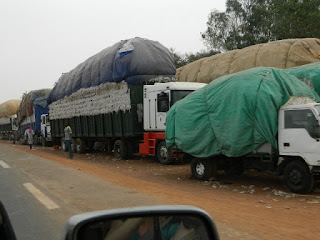
This cotton is collected by lorries and transported to the factories which treat it. This season it has taken longer to collect the cotton, as the hangars for stocking cotton at the factories are no longer in use, and so the lorries have to wait to unload it directly into the factory.
When we went down to Parakou a couple of months ago we saw lots of lorries waiting outside one of the factories.


We also saw these men working to stuff pillows and mattresses with the spare cotton. Whether it is just the cotton that falls from the lorries or whether it is cotton which the factory has rejected, we're not sure.

At any rate, I've felt one of these pillows in the market, and they are harder than anything I'd like to rest my head on at night!







